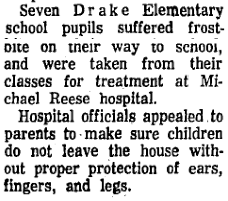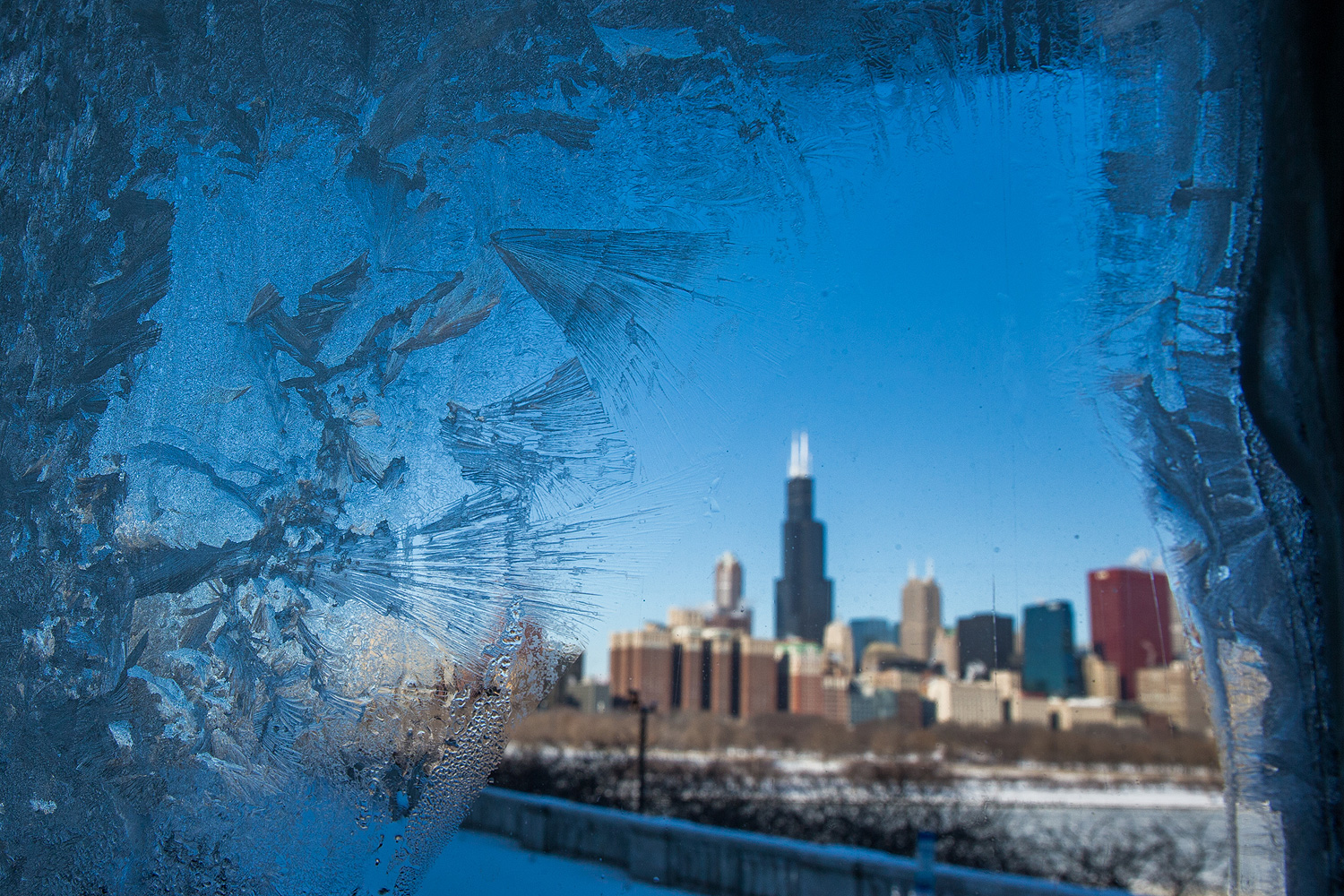Despite being a son of the South, I spent much of my childhood in Chicagolike cold, even if I had to venture to find it: backpacking in whiteout conditions in the Grayson Highlands, skiing rough, icy slopes in the North Carolina mountains, shooting hoops through a cracked, frozen net during the ice storm of 1994. I'm supportive of the free-range parents who are bringing back the walk to school, and envious of the Dutch parents who send their kids off to school by bike.
So I'm sympathetic to the view that Kids These Days are overprotected. But I'm also inherently skeptical of back-in-my-day charges that follow in its wake. Especially when they ask the eternal Chicago question What Would Ditka Do? or any variation on the word "wuss."
Really, with the roads clear, no new snow, minimal wind and even the sun shining brightly on a clear, crisp day, we close our schools in January because it is … cold? From the Tribune:
Alleged global warming aside, we still live in Chicago, no? Consider this the continued wussification of society.
And just what are we talking about? Expected lows of — hold on tight — minus 8. Come on, Mike Ditka would play football sleeveless in minus 8.
(I dunno; I'm also skeptical of taking safety advice from 1960s NFL players.)
Once upon a time, we looked for excuses to work hard and persevere. Today, however, it seems as if we search for opportunities to call it a day and shut down shop.
Judging by how many people say this, it must be true. So when was that once upon a time?
The earliest instance I could find of Chicago closing its schools due to winter weather was January 23, 1927—a low of 17 below zero at 8 a.m. with a high of zero. Then-superintendent William J. Bogan "pointed out that, although the schools were well heated, the danger for pupils are serious because of the slippery streets." Then again, it was the Roaring Twenties, which was pretty softbatch, culturally speaking. Catholic schools remained open.
The next incidents I could find were in 1966 and 1967; in the midst of a snowstorm in February of the latter year, the Trib reported that "city public schools had only canceled classes once for the weather, and that was a year ago." Which doesn't appear to be quite accurate—see above—but at least suggests canceling school was extremely rare.
Finally, in 1977, it seems schools started to close with some consistency due to the cold—as separate from snow—though it remained infrequent. It happened twice that year, at least.
First, on January 28, 1977, as the Tribune reported a couple days later: "Chicago public schools were to reopen Monday after being closed Friday because of the severe cold and high winds which posed the danger of frostbite for anyone outdoors."
The weather that day? A high of 19, a low of 13 below, with a maximum wind speed of 29 miles per hour and a max gust speed of 41 miles per hour. Depending on the specific conditions, that gets into the 30-minute and 10-minute frostbite zone.
On December 10, 1977, the Trib reported:
Friday's weather was brutal. Almost 200 area schools were closed. Early in the morning the wind chill factor made the temperature equal to 48 degrees below zero. The weather was attributed as a factor in the deaths of 14 persons, usually from walking or working in the snow. Several Chicago hospitals reported treating persons for frostbite.
Compare that to this week:
School officials are faced with a forecast that calls for temperatures to drop into the single digits below zero overnight Tuesday and wind chills as low as 40 below, according to the National Weather Service. The high on Wednesday may not get past zero, with gusting winds again driving wind chills to 30 below or worse.
A few years later, Chicago set its all-time record: 26 below with a wind chill of 81 below on Sunday, January 10, 1982. City schools were closed the next day, though the low was a balmy two below. Even the rugged Catholic elementary schools closed, though "Catholic high schools were deciding individually Sunday night whether to open Monday."
On January 5, 1988, many suburban schools closed after temperatures fell to nine below overnight, with wind chills of 38 below. Chicago schools stayed open, but only because they were out of weather days after a teacher walkout that year. It didn't go well; buses ran late or failed to show up at all at many schools.
Which brings us to the 1990s, when the Sun-Times reported one two-day closure in January 1994 (lows of 15 below and 11 below), and another in January 1997 (wind chills of 40 to 50 below).
So—it appears we can date the "wussification" of society to 1977, which means we can blame baby boomers, which is always fun.
Prior to that, it appears that area schools did indeed dispatch their children out into the bitter cold, excepting extreme snowfalls. It's unclear whether that built character, but it did have more immediate results sometimes. Like on January 24, 1963, with a low of 18 degrees below zero at 10 a.m.:

Which is good advice no matter what. As far as actually getting them to leave the house, I suppose there's always Catholic school.
UPDATE: After this post was published, Bill Choslovsky, who wrote the original column in the Tribune, reached out with a response. We have reprinted it below.
Though I am all for a good ribbing, I reach out to see if there is some common ground here. I am naïve enough to think—and hope—that facts actually matter, at least once in a while.
It seems incontrovertible to me that something has changed recently when it comes to deciding to close schools because of cold (not snow). Your own research indicates it rarely happens, yet CPS did so 4 times last year and already twice this year. Before that, it hadn’t closed because of cold even once since 2000. As such, something has obviously changed and it is not the weather.
If the new “standard” is closing schools when there are subzero absolute temperatures with wind chill of at least -20, then somebody should say that. And if that is the new standard, then we should plan on having schools closed about 10 times each winter.
To argue whether schools should be closed is fair, but to argue that we are now closing much more frequently than in the past is fact, I think.



